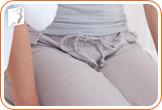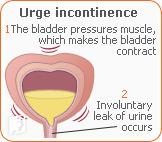Urinary incontinence is one of the most unpleasant obstacles that people face as they get older. Though the severity of the condition varies, any lack of bladder control can be embarrassing. The key to treating urinary incontinence, of course, is learning about some of its potential causes. Read on to discover four of the most common triggers for urinary incontinence.
Hormonal Imbalance

The most common trigger for urinary incontinence among women is hormonal imbalance from menopause. Estrogen, which can dip drastically during this stage in life, is partially responsible for maintaining the health of the urinary tract lining and keeping muscles strong. Weak pelvic muscles and a weakened urinary tract are direct causes of incontinence and discomfort.
Weight Gain
Weight gain, a common occurrence during menopause, can be a contributing factor to urinary incontinence. Excess fat, especially when carried around the waist, increases pressure on the stomach and bladder and weakens the urethra. Individuals with a body mass index (BMI) of 30 or higher are at greater risk for experiencing urinary incontinence. Pregnancy can have the same effect.
Infections or Growths

Though hormonal imbalance is often the culprit of urinary incontinence, other factors may be responsible for triggering this symptom. Urinary tract infections (UTIs) can lead to urinary incontinence, as they cause the muscles in the bladder to contract too frequently, creating the sensation of always needing to go to the bathroom. Tumors in the lower bladder could also be to blame, though these are much less common. A doctor should attend to any perceived UTI as soon as possible to avoid it spreading to the bladder or kidneys.
Medications
Some medications, including ones used for treating menopause symptoms, list urinary incontinence as a potential side effect. These medications can interrupt the normal storing and passing of urine as well as increase the quantity of urine produced, leading to unexpected overflow. Known offenders include diuretics, some antidepressants, and sedatives.

Hormone replacement therapy (HRT), a popular method used to manage the hormonal imbalance of menopause, can also result in incontinence. HRT is now only recommended as a last resort for severe symptoms due to its unpleasant and potentially dangerous side effects.
Urinary incontinence is never a pleasant experience, but once triggers are identified, managing and treating the condition can be easy. Simple lifestyle changes in diet and exercise may be enough, and herbal supplements can help balance hormonal levels the natural way. Knowledge is power, so learn as much as you can about the causes of your incontinence to get on the road to recovery.
Sources
- National Health Service UK. (2012). Urinary Incontinence - Causes - NHS Choices.Retrieved August 26, 2013 from http://www.nhs.uk/Conditions/Incontinence-urinary/Pages/Causes.aspx


